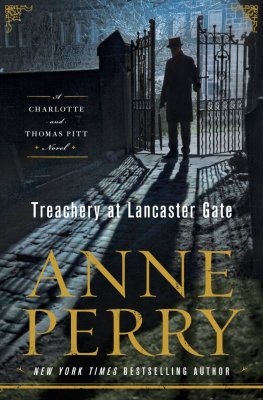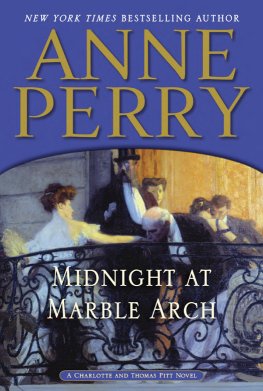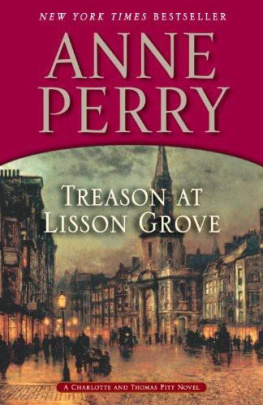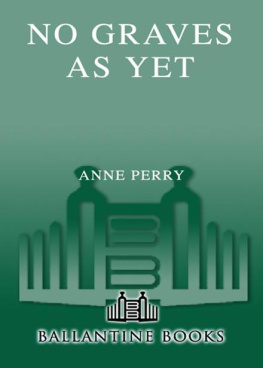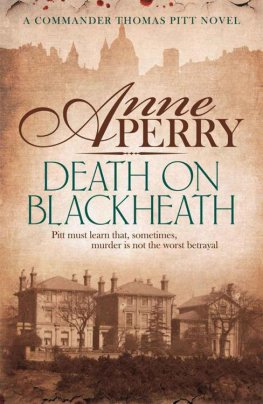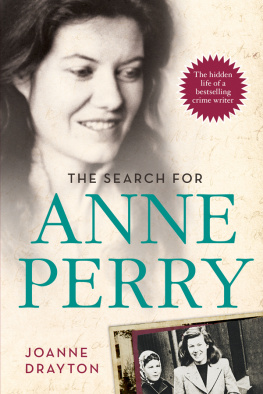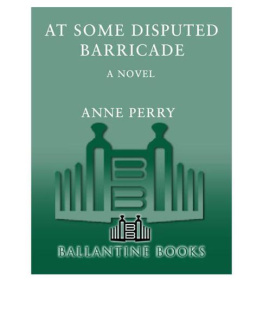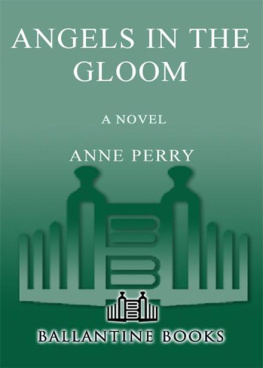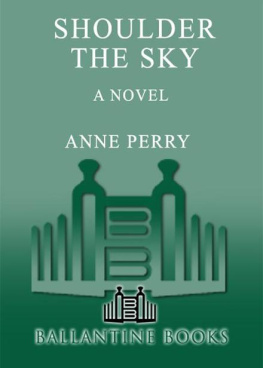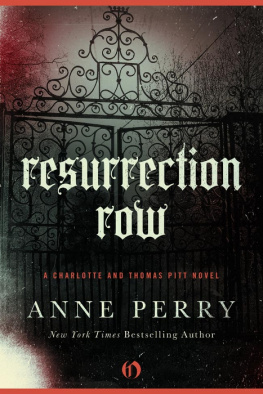Anne Perry - Cardington Crescent
Here you can read online Anne Perry - Cardington Crescent full text of the book (entire story) in english for free. Download pdf and epub, get meaning, cover and reviews about this ebook. genre: Detective and thriller. Description of the work, (preface) as well as reviews are available. Best literature library LitArk.com created for fans of good reading and offers a wide selection of genres:
Romance novel
Science fiction
Adventure
Detective
Science
History
Home and family
Prose
Art
Politics
Computer
Non-fiction
Religion
Business
Children
Humor
Choose a favorite category and find really read worthwhile books. Enjoy immersion in the world of imagination, feel the emotions of the characters or learn something new for yourself, make an fascinating discovery.

- Book:Cardington Crescent
- Author:
- Genre:
- Rating:3 / 5
- Favourites:Add to favourites
- Your mark:
- 60
- 1
- 2
- 3
- 4
- 5
Cardington Crescent: summary, description and annotation
We offer to read an annotation, description, summary or preface (depends on what the author of the book "Cardington Crescent" wrote himself). If you haven't found the necessary information about the book — write in the comments, we will try to find it.
Cardington Crescent — read online for free the complete book (whole text) full work
Below is the text of the book, divided by pages. System saving the place of the last page read, allows you to conveniently read the book "Cardington Crescent" online for free, without having to search again every time where you left off. Put a bookmark, and you can go to the page where you finished reading at any time.
Font size:
Interval:
Bookmark:
Anne Perry
Cardington Crescent
1
Mrs. Peabody was hot and out of breath. It was midsummer; her stays imprisoned her unyieldingly and her gown, with its fashionable bustle, was far too heavy to allow her to go chasing down the pavement after a willful dog that was fast disappearing through the wrought-iron churchyard gates.
Clarence! Mrs. Peabody cried out furiously. Clarence! Come back here at once!
But Clarence, who was fat and middle-aged and should have known better, squirmed through the gap and shot away into the long grass and the laurel bushes on the other side of the railings. Mrs. Peabody, gasping with annoyance and clinging on to her broad hat with one hand, sending it rakishly over her eyes, tried with the other to force the gates open far enough to allow her extremely ample form to pass through.
The late Mr. Peabody had preferred women of generous proportions. He had said so frequently. A mans wife should reflect his position in life: dignified and substantial.
But it took more aplomb than Mrs. Peabody possessed to remain dignified while caught by ones bosom in a churchyard gate with ones hat askew and a dog yelping like a fiend a dozen yards away.
Clarence! she shrieked again and, drawing in her breath, gave a mighty heave, which had the opposite effect from the one desired. She let out a wail of desperation, and struggled through, her bustle now alarmingly closer to her left hip.
Clarence was barking hysterically and scuffling in the laurel bushes. The ground was dry after a week without rain and he was sending up spurts of dust. But he had his prize, a very large, sodden-looking parcel wrapped in brownish paper and tied securely with twine. Under Clarences determined efforts it was now torn in several places and beginning to come undone.
Drop it! Mrs. Peabody commanded. Clarence ignored her. Drop it! she repeated, wrinkling her nose in distaste. It was really very unpleasant; it appeared to be kitchen leavings-unusable meat. Clarence!
The dog ripped off a large piece of the paper, wet with blood and coming away easily. Then she saw it-skin. Human skin, pale and soft. She screamed; then as Clarence exposed more of it she screamed again, and again, and again, until her lungs were bursting and she could not find breath and the world spun round her in a red haze. She fell to the ground, unaware of Clarence, still tugging at the parcel, and passersby forcing their way through the stuck gate in alarm.
Inspector Thomas Pitt looked up from his desk, strewn with paper, glad of the interruption. What is it?
Police Constable Stripe stood in the doorway, his face a little pink above his stiff collar, his eyes blinking.
Im sorry, sir, but theres a report of a disturbance in St. Marys churchyard in Bloomsbury. An elderly person avin ysterics. Quite respectable, and locally known-and doesnt touch the gin. Usband was Temperance, afore e died. Never bin a nuisance in the past.
Perhaps shes ill? Pitt suggested. Doesnt need more than a constable, does it? Maybe a doctor?
Well, sir. Stripe looked distressed. Seems er dog ran away and found this parcel in the bushes, an she thought it was part of a person. Thats what gave er ysterics.
What on earth do you mean, part of a person? Pitt demanded irritably. He liked young Wilberforce Stripe; he was normally keen and reliable. This vague story was unlike him. Whats in this parcel?
Well, thats it, Mr. Pitt, sir. The constable on the beat says e asnt touched it moren necessary afore you get there, sir, but by is reckoning thats just what it is-a part of a womans body. The-er He was clearly embarrassed. He did not wish to be indelicate, yet was aware that a policeman should be precise. He placed one hand across his waist and the other across his neck. The top alf, sir.
Pitt stood up, papers cascading off his lap onto the floor and remaining there. In spite of his seventeen years in London, where the sumptuous and elegant heart of the Empire disported itself a stones throw from slums that teemed with poverty so intense rotting tenements stood stacked against each other, fifteen people to a room living and dying together, he had not ceased to be shocked by the savagery of crime. He could not grasp the mass-the mind refused. But the pain of the individual still had power to move him.
Then wed better go and see, he replied, ignoring the disarray around him and leaving his hat on the stand where he had thrown it on arriving in the morning.
Yes, sir. Stripe fell in behind him, following Pitts familiar disheveled figure along the corridor, down the steps past several other constables, and into the hot and dusty street. An empty hansom clattered past them, not believing Pitt, with his coattails flapping and his tie askew, to prove a likely fare. Stripe, in uniform, was not even worth considering.
Pitt waved his arm and ran a few steps. Cabbie! he shouted, his anger directed not at the personal slight but against all crime in general, and this one he was going to pursue in particular.
The cabbie drew rein and looked at him with disfavor. Yes, sir?
St. Marys churchyard, Bloomsbury. Pitt scrambled in and held the door for Stripe, behind him.
Will that be the east side or the west side? the cabbie inquired.
The back gate, off the avenue, Stripe put in helpfully.
Thank you, Pitt acknowledged; then, to the cabbie, Get on with it, man!
The cabbie flicked the whip and made encouraging sounds, and they moved off, rapidly increasing to a trot. They rode in silence, each absorbed in his own speculations as to what they might find.
This ere where you wanta be, sir? the cabbie leaned down and asked dubiously.
Yes. Pitt had already seen the little knot of people and the harassed constable in the middle. It was an ordinary, rather seedy suburban churchyard; dusty, grass dry with the summer heat, gravestones uneven and ornate, marble angels, and over on the right before the yew trees, a clump of dark laurels.
He climbed out, paid the driver, then crossed the pavement and spoke to the constable, who was obviously overwhelmed with relief to see him.
What have you got? Pitt asked dourly.
The constable jerked his elbow towards the high, spiked railings but did not turn his head. His face was pale and there was a heavy beading of sweat on his lip and across his brow. He looked wretched. Top alf of a womans body, sir. He swallowed hard. Pretty orrible, it is. It was under them bushes.
Who found it, and when?
A Mrs. Ernestine Peabody, out walking er Pekingese dog by the name o Clarence. He glanced down at his notebook. Pitt read from it upside down; 15th June, 1887, 3:25 P.M., called to St. Marys churchyard, woman screaming.
Where is she now? Pitt asked.
Sittin on the seat in the church vestibule, sir. Shes took pretty bad, an I said as soon as youd spoke to er she could go ome. Its my opinion, sir, as she wont be much use to us.
Probably not, Pitt agreed. Where is this parcel?
Where I found it, sir! I didnt touch it moren to make sure she wasnt avin-delusions, like. On the gin.
Pitt went to the gates, heavy wrought iron and stuck fast, a little over a foot apart, wedged in the ruts of the dried mud. He squeezed through and walked along the inside of the railing till he came to the laurel bushes. He knew Stripe was immediately behind him.
The parcel was about nineteen inches square, lying where Clarence had left it, paper torn and pulled away to expose the meatlike flesh and several inches of fine-grained, white skin smeared a little with blood. There were flies beginning to gather. He did not have to touch it to see that the portion showing was part of a womans breast.
He straightened up, feeling so sick he was afraid he was going to faint. He breathed deeply-in and out, in and out-and heard Stripe blundering away, choking and retching behind a gravestone carved with cherubs.
Font size:
Interval:
Bookmark:
Similar books «Cardington Crescent»
Look at similar books to Cardington Crescent. We have selected literature similar in name and meaning in the hope of providing readers with more options to find new, interesting, not yet read works.
Discussion, reviews of the book Cardington Crescent and just readers' own opinions. Leave your comments, write what you think about the work, its meaning or the main characters. Specify what exactly you liked and what you didn't like, and why you think so.

